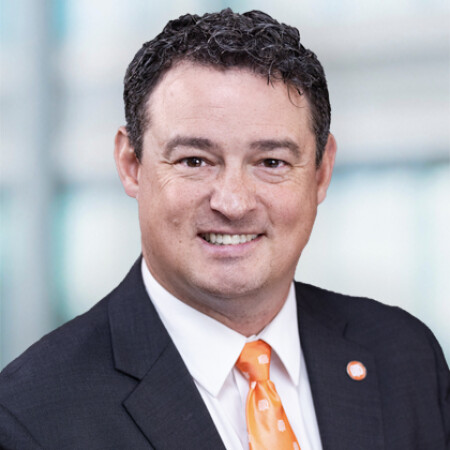PhD - Psychology (Cognitive Neuroscience)
George Washington University - 2010

Adam J. Woods
Dean, School of Behavioral and Brain Sciences, Aage and Margareta Møller Distinguished Professor in Behavioral and Brain Sciences
+1 (972) 883-2492
GR 4.104J
Endowed Profile
Curriculum Vitae
ORCID
Not currently accepting undergraduate or graduate students
Professional Preparation
BS - Psychology
University of Alabama at Birmingham - 2003
University of Alabama at Birmingham - 2003
Research Areas
Pathways of Prevention in Cognitive Aging & Dementia using Neuromodulation
Cognitive function declines as we age. As our thinking and memory skills decline, the rate of functional dependence, mortality, and acute illness requiring hospitalization increases. Increased rates of cognitive and functional decline associated with dementia represent a growing concern considering our rapidly aging population. There is currently a paucity of effective treatments for preventing dementia or recovering age-related cognitive decline. A variety of methods have been proposed to counteract cognitive aging and/or slow onset of dementia (e.g., cognitive training). Unfortunately, these techniques have limited degrees of success and transfer to everyday life. My work demonstrates that combining treatments like cognitive training with non-invasive brain stimulation (tDCS, TMS, tACS) facilitates neural plastic response, improves cognitive abilities (specifically working memory, attention, and speed of processing), and leads to long-term improvement. In combination with modern multimodal neuroimaging, artificial intelligence, and electrophysiology recording, this work not only identifies mechanisms underlying improvement, but also provides information important for further optimizing treatment effectiveness. This work has led to funding of the largest and first Phase III randomized clinical trial for tDCS as an adjunctive method with cognitive training to remediate cognitive aging and potentially prevent dementia onset. In addition, my lab has been funded to investigate mobility enhancement in older adults, treat chronic knee osteoarthritic pain, and enhance working memory function using a variety of non-invasive electrical brain stimulation methods in Phase II trials. My lab maintains active NIH funding to investigate non-invasive brain stimulation and other neuromodulation-based preventative interventions. At present, a major focus in my lab uses machine learning and other artificial intelligence approaches paired with multimodal imaging, behavior and clinical variables/outcomes to identify novel pathways to precision dosing/medicine applications of non-invasive brain stimulation methods in patient populations and predict neurodegenerative disease onset. Collectively, my work aims to slow the effects of cognitive aging and slow the onset of dementia using non-invasive and minimally invasive approaches.Publications
Hardcastle, C., Kraft, J. N., Hausman, H. K., O'Shea, A., Albizu, A., Evangelista, N. D., Boutzoukas, E. M., Van Etten, E. J., Bharadwaj, P. K., Song, H., Smith, S. G., Porges, E., DeKosky, S. T., Hishaw, G. A., Wu, S. S., Marsiske, M., Cohen, R., Alexander, G. E., & Woods, A. J. (2024). Learning ratio performance on a brief visual learning and memory test moderates cognitive training gains in Double Decision task in healthy older adults. GeroScience, 46, 3929-3943. - publications
Stolte, S. E., Indahlastari, A., Chen, J., Albizu, A., Dunn, A., Pedersen, S., See, K. B., Woods, A. J., & Fang, R. (2024). Precise and Rapid Whole-Head Segmentation from Magnetic Resonance Images of Older Adults using Deep Learning. Imaging neuroscience (Cambridge, Mass.), 2, 10.1162/imag_a_00090. - publications
Lopez, F. V., O'Shea, A., Huo, Z., DeKosky, S. T., Trouard, T. P., Alexander, G. E., Woods, A. J., & Bowers, D. (2024). Frontal-temporal regional differences in brain energy metabolism and mitochondrial function using 31P MRS in older adults. GeroScience, 46(3), 3185–3195. - publications
Ho, B. D., Gullett, J. M., Anton, S., Franchetti, M. K., Bharadwaj, P. K., Raichlen, D. A., Alexander, G. E., Rundek, T., Levin, B., Visscher, K., Woods, A. J., & Cohen, R. A. (2024). Associations between physical exercise type, fluid intelligence, executive function, and processing speed in the oldest-old (85 +). GeroScience, 46(1), 491–503. - publications
Indahlastari, A., Dunn, A. L., Pedersen, S., Kraft, J. N., Someya, S., Albizu, A., & Woods, A. J. (2023). Impact of electrode selection on modeling tDCS in the aging brain. Frontiers in human neuroscience, 17, 1274114. - publications
Waner, J. L., Hausman, H. K., Kraft, J. N., Hardcastle, C., Evangelista, N. D., O'Shea, A., Albizu, A., Boutzoukas, E. M., Van Etten, E. J., Bharadwaj, P. K., Song, H., Smith, S. G., DeKosky, S. T., Hishaw, G. A., Wu, S. S., Marsiske, M., Cohen, R., Alexander, G. E., Porges, E. C., & Woods, A. J. (2023). Connecting memory and functional brain networks in older adults: a resting-state fMRI study. GeroScience, 45(5), 3079–3093. - publications
Lopez, F.V., O’Shea, A., Rosenberg, J.T., Leeuwenburgh, C., Anton, S., Bowers, D., Woods, A.J. (2023) Frontal adenosine triphosphate markers from 31P MRS are associated with cognitive performance in healthy older adults: preliminary findings. Frontiers in Aging Neuroscience, 15 https://doi.org/10.3389/fnagi.2023.1180994 - publications
Hausman, H. K., Alexander, G. E., Cohen, R., Marsiske, M., DeKosky, S. T., Hishaw, G. A., O'Shea, A., Kraft, J. N., Dai, Y., Wu, S., & Woods, A. J. (2023). Primary outcome from the augmenting cognitive training in older adults study (ACT): A tDCS and cognitive training randomized clinical trial. Brain stimulation, 16(3), 904–917. - publications